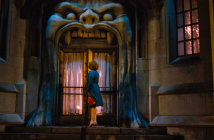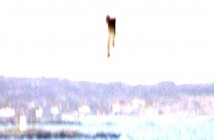
L’Avventura (1960)
Cast: Gabriele Ferzetti, Monica Vitti, Lea Massari
Director: Michelangelo Antonioni
Country: Italy | France
Genre: Drama | Mystery
Editor’s Note: L’avventura was released on Criterion Blu-ray Tuesday November 25th.
Michelangelo Antonioni’s cinema is not only the cinema of class-afforded ennui, of works that see languor as a byproduct of privilege, an offshoot of life stripped of its most innate anxieties, but also the cinema of time, of its erosive effects on memory and other such mental constructs, which, gossamer in nature, permutate in parallel to temporal passage, allowing for certain details to become increasingly apparent while others further obscure in a process of ostensible chaos that, in all actuality, is the ever evolving result of order and precision that occurs deep to the limen of human perception, exactitude. To suggest his pictures, especially those of his thematic trilogy on, per Stephen Holden, “Modernity and its discontents,” and of them, especially L’avventura, as flat criticisms of monetarily granted malaise would do disservice to the dynamic portraits of Italy and humanity he paints both intra and inter-film. His characters are listless organisms, sure, but they are organisms nonetheless, creatures who react to stimuli – even if they’re to manufacture it themselves – and change, or tellingly not, based on such interaction and exposure.
Michelangelo Antonioni’s cinema is not only the cinema of class-afforded ennui, of works that see languor as a byproduct of privilege, an offshoot of life stripped of its most innate anxieties, but also the cinema of time …

Although humanity has long synthesized ways of monitoring and recording time, its advancement is nonetheless a subjective phenomenon that, generally speaking, is related to the time we’ve spent so far in existence (I.e. our age). More abstract and personally dependent, however, is how the passage of time distorts our emotional investment in a given relationship or subject, which is cogently demonstrated by the far-reaching idiom of “Time heals all.” No matter the gravity of any given circumstance, the slippage of our temporal footing forces we mortals to adapt, to reevaluate fixations of the past in favor of present matters and future apprehensions. Using his country’s post-war economic boom as scaffolding, Antonioni’s L’avventura constructs a world of advantage so casually lavish that former concerns of both fiscal and fatal origins have become wholly eclipsed by the presence of extravagance. In this, wealth and access become catalysts for the dilutive relationship between time and memory; characters are still able to perceive and process grief but, given a lack of social obstacles, do so in a grossly accelerated, seemingly amoral manner. In fact, feelings and emotions – which are usually more verbally explicated than they are tellingly gestured, and purposefully so – progress so fast that it becomes logical to question how genuine they were initially felt. But rather than unilaterally criticize the actions of those onscreen, I find it’s more stimulating to ask at what point does forgetting something, someone become morally acceptable, and how this can be a reflection of social standing.
Aside from the overarching commentary on the manipulating and manipulative nature of time and our perception thereof, Antonioni lines the narrative of L’avventura with other acerbic jabs at his homeland’s cultural landscape, namely their treatment of women.
Most obviously, what’s forgotten – or rather, unremembered – in L’avventura is Anna (Lea Massari), a diplomat’s daughter who vanishes from a Mediterranean island during an upper-crust recreational cruise. Anna is a relatively introspective entity, one who laments the current state of her formerly long-distance relationship to Sandro (Gabriele Ferzetti), specifically how geographical remove had afforded the couple an illusory happiness that’s missing in actuality. Bored while swimming, she conjures up a story of a shark sighting, less for attention, I think, than for visceral thrill and sensorial immediacy of the fib; her social circle revels in these kind of experiences, exhibiting a penchant for speedy driving, exotic getaways, and spontaneous copulating, even if these acts are regarded more for their inherent exclusivity than their accompanying exhilaration – a far more fleeting quality than the former. (And yes, love and sex is treated as a purchasable commodity throughout.) It’s this pattern of behavior that leads Claudia (Monica Vitti), a friend to whom Anna admitted the fabrication of the “shark story,” to believe that her disappearance is merely another exercise in class and boredom, that she’ll soon emerge unscathed from the more treacherous than tropical island they’re visiting.
But Anna never does materialize from the foaming, craggy coast, and the rest of their party begins to grow impatient, concentrating their concern not on Anna but, through inane bickering, how their peers perceive their projected compassion; their worries of self-image, collectively, come to supersede those of a missing friend. As such, Antonioni is not only criticizing a certain sub-group of people but also the socioeconomic mechanisms that allow humans to achieve so efficient an emotional disconnect. Those closest to Anna – paramour Sandro, friend and confidante Anna, her spiritually naïve father – are able to sustain an active hope of finding her, but only for so long before they too are feigning interest in the name of respectability. L’avventura elucidates how time is most certainly a social construct, and a disarming one at that. As people become more temporally and geographically distanced from a situation, the vividness once associated with those realities dissolves slowly into the nebulous, and everything-and-one not of the present becomes something ethereal, intangible; financial comfort, it’s posited, only expedites this process.
Aside from the overarching commentary on the manipulating and manipulative nature of time and our perception thereof, Antonioni lines the narrative of L’avventura with other acerbic jabs at his homeland’s cultural landscape, namely their treatment of women. A humorous but no less damning scene shows men of a small town rioting over a beauty in a provocatively torn dress, during which we learn that the males of a neighboring village responded with an identical lack of self-restraint. Later on, Antonioni further imposes this charge of rampant objectification in a shudder-worthy diorama that shows Claudia, a solitary, smartly dressed female figure, being stared at more malevolently than flirtatiously by an almost comical number of local fellows, all less interested in her chic ensemble than what lies under it. The particular instance is at once smirk-worthy (onlookers/admirers materialize from seemingly impossible places just to get a good peak/stare at her) and horrifying, given the implication that this is not only how women are treated cinematically but socially to boot.
As its narrative unspools further, the idea of time in L’avventura, particularly how much of it has passed from scene to scene, becomes increasingly indiscernible as the emotions of characters change with inappropriate rapidity. Early on, Sandro and Claudia and the others all look for clues to Anna’s disappearance, and every lead or piece of evidence they come by is something that furthers their mission’s drive and purpose: A small boat heard in the periphery may have taken her ashore; a woman of a similar description was spotted in a nearby fishing town; the brunette topped head of an escort recalls, however briefly, that of the missing girl. These details give the search party an optimistic flourish, feeding the reverie that their Anna will soon be found. But how quickly this all changes. The characters move on emotionally faster than they do intellectually – Claudia being the only one self-conscious enough to realize the transformation, feeling helpless to it nonetheless – and come to hope that maybe she really wasn’t seen somewhere in town, or that she didn’t actually board a passing vessel. The search for turns into an escape from, and in senses both physical and memorial. Thus, the real intrigue of L’avventura, to me, comes not from the corporeal disappearance of Anna the person but the anamnestic and emotional evanescence of Anna the construct, the memory. The work ends on a vexing note, as we come to fear not only the transient nature of our existence, to ourselves and to others, but also the system that promotes this lack of remembrance.
Transfer
“It looks like oil!” exclaims a character as their yacht glides across the eerily still Mediterranean surface. And they’re right. Almost preternaturally inert, the sea looks inky and surreal as they traverse atop it, with only small, disruptive bubbles of air escaping the engulfing dark along the waves’ crests. The image quality here is largely flawless, as is the case with the majority of this Criterion 4K transfer. Fine object detail – you can actually discern the individual droplets of water on Vitti’s shoulders following her brief bout in the sea – and landscapes alike look adroitly rendered, and the image is reliably stable. Shots involving the aphotic, depthless sea and the threateningly infertile islands are most impressive in terms of shear compositional beauty, but I find that the textures of sun-kissed skins and fine fabrics are no less enchanting. There are some issues with print damage, but almost exclusively to the film’s first hour and always near the frame’s edge. Sound, as expected, is very stable, offering supportive aural accompaniment to Antonioni’s rightly heralded visuals.
Extras
Supplemental material, though predominantly imported from the 2001 Criterion DVD, does well in offering variegated perspectives and interpretations to Antonioni’s work from colleagues, contemporaries, and collaborators, and even allows for the director himself to proffer insights (Spoiler alert: He’s smarter than us all). Also, and although I’m not his biggest fan, the 27-minute exegesis by Olivier Assayas makes for a nice addition to the release, as the film is so richly dense and influential that no amount of discussion ever truly feels sufficient. In short, this is something you should own.
Using his country’s post-war economic boom as scaffolding, Antonioni’s L’avventura constructs a world of advantage so casually lavish that former concerns of both fiscal and fatal origins have become wholly eclipsed by the presence of extravagance. In this, wealth and access become catalysts for the dilutive relationship between time and memory; characters are still able to perceive and process grief but, given a lack of social obstacles, do so in a grossly accelerated, seemingly amoral manner.



